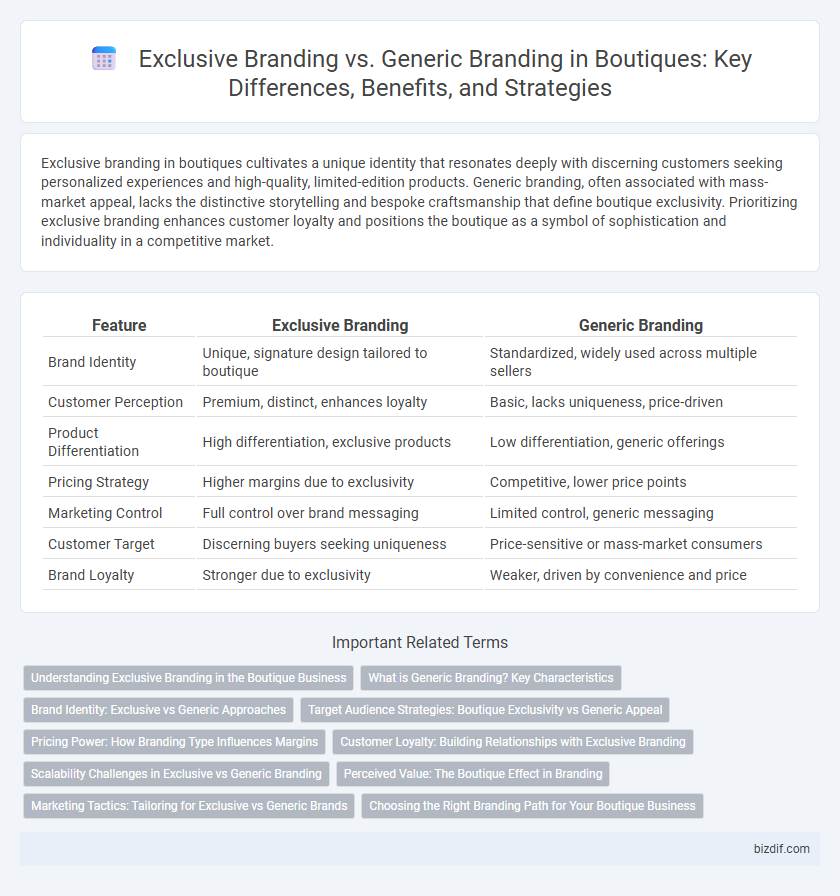Exclusive branding in boutiques cultivates a unique identity that resonates deeply with discerning customers seeking personalized experiences and high-quality, limited-edition products. Generic branding, often associated with mass-market appeal, lacks the distinctive storytelling and bespoke craftsmanship that define boutique exclusivity. Prioritizing exclusive branding enhances customer loyalty and positions the boutique as a symbol of sophistication and individuality in a competitive market.
Table of Comparison
| Feature | Exclusive Branding | Generic Branding |
|---|---|---|
| Brand Identity | Unique, signature design tailored to boutique | Standardized, widely used across multiple sellers |
| Customer Perception | Premium, distinct, enhances loyalty | Basic, lacks uniqueness, price-driven |
| Product Differentiation | High differentiation, exclusive products | Low differentiation, generic offerings |
| Pricing Strategy | Higher margins due to exclusivity | Competitive, lower price points |
| Marketing Control | Full control over brand messaging | Limited control, generic messaging |
| Customer Target | Discerning buyers seeking uniqueness | Price-sensitive or mass-market consumers |
| Brand Loyalty | Stronger due to exclusivity | Weaker, driven by convenience and price |
Understanding Exclusive Branding in the Boutique Business
Exclusive branding in the boutique business emphasizes unique, high-quality products tailored to a specific target audience, enhancing perceived value and customer loyalty. This approach differentiates boutiques by creating a distinct identity through limited editions, personalized services, and curated collections that resonate deeply with niche markets. Understanding exclusive branding enables boutiques to command premium pricing and foster stronger emotional connections with discerning customers.
What is Generic Branding? Key Characteristics
Generic branding refers to products that are marketed without a recognizable brand name, often emphasizing functionality and low cost over unique identity. Key characteristics include minimal to no packaging design, lack of brand recognition, and pricing strategies aimed at affordability and mass market appeal. These products typically rely on widespread distribution and basic quality standards rather than marketing differentiation.
Brand Identity: Exclusive vs Generic Approaches
Exclusive branding cultivates a distinctive brand identity through unique logos, custom packaging, and tailored customer experiences that foster strong emotional connections and brand loyalty. Generic branding employs standardized visuals and messaging to appeal to a broader audience, often sacrificing uniqueness for mass recognition. Boutique businesses benefit from exclusive branding by emphasizing personalization and niche market appeal, which differentiates them from generic competitors.
Target Audience Strategies: Boutique Exclusivity vs Generic Appeal
Boutique exclusivity targets niche markets with personalized experiences and high-quality, unique products that foster strong brand loyalty among discerning customers. Generic branding aims for mass appeal through standardized products and broad marketing strategies to attract a wide demographic. Tailoring branding strategies to specific target audiences enhances customer engagement and drives business growth effectively.
Pricing Power: How Branding Type Influences Margins
Exclusive branding in boutiques commands higher pricing power due to unique product differentiation and limited availability, allowing for elevated profit margins. Generic branding competes primarily on price, which compresses margins and reduces pricing flexibility. Therefore, boutiques leveraging exclusive brands can strategically enhance profitability through premium pricing.
Customer Loyalty: Building Relationships with Exclusive Branding
Exclusive branding cultivates strong customer loyalty by creating a unique identity that resonates deeply with boutique shoppers seeking personalized experiences. This approach fosters emotional connections through limited editions, bespoke products, and targeted storytelling that generic branding often lacks. As a result, customers perceive higher value and authenticity, driving repeat purchases and long-term relationship building.
Scalability Challenges in Exclusive vs Generic Branding
Exclusive branding offers a unique identity that fosters customer loyalty but faces scalability challenges due to higher production costs and limited market reach. Generic branding benefits from broad appeal and cost-effective scaling but often lacks differentiation, leading to intense competition and slower brand recognition growth. Balancing exclusivity with scalable strategies requires customized marketing and supply chain adaptations to optimize growth potential in boutique business models.
Perceived Value: The Boutique Effect in Branding
Exclusive branding in boutiques elevates perceived value by creating a unique identity closely tied to craftsmanship, limited availability, and personalized customer experiences. This distinctive branding strategy fosters strong emotional connections and loyalty, setting products apart from generic brands that often compete primarily on price and mass appeal. The boutique effect leverages scarcity and authenticity, enhancing desirability and allowing higher price points justified by the exclusivity perceived by discerning consumers.
Marketing Tactics: Tailoring for Exclusive vs Generic Brands
Exclusive branding emphasizes personalized marketing tactics that highlight rarity, artisanal craftsmanship, and high-quality materials to attract niche audiences seeking luxury and uniqueness. Generic branding employs broad-reach campaigns focusing on affordability, functionality, and accessibility to appeal to mass markets. Tailored marketing strategies for exclusive brands often leverage storytelling and influencer partnerships, while generic brands optimize cost-effective mass media and volume-driven promotions.
Choosing the Right Branding Path for Your Boutique Business
Exclusive branding elevates your boutique by creating a unique identity that attracts a dedicated clientele willing to pay premium prices for distinctive products. Generic branding offers broader appeal and lower costs but risks blending into a crowded market, reducing customer loyalty and perceived value. Selecting the right branding path depends on your target audience, product uniqueness, and long-term business goals to ensure sustained growth and profitability.
Exclusive Branding vs Generic Branding Infographic

 bizdif.com
bizdif.com